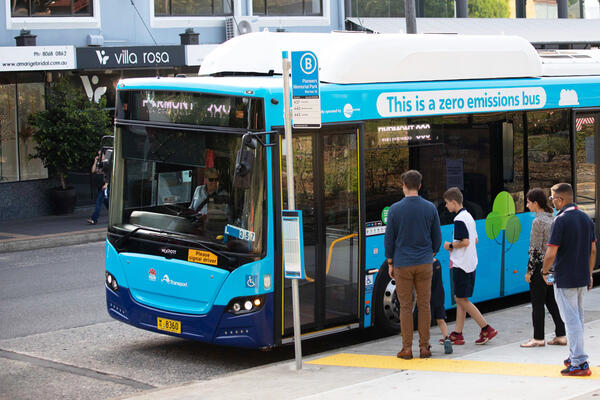
Zero Emission Buses – Paving the way for sustainable transport
The shift to Zero Emission Buses (ZEBs) is a key part of our plan to create a more sustainable public transport system.
We recently committed to purchasing an additional 319 ZEBs. This investment accelerates the decarbonisation of public transport, supports local manufacturing and creates jobs in the clean energy sector. With 132 Zero Emission Buses already on the road and a commitment to transition the entire fleet to zero emissions by 2035, we’re making steady progress towards our decarbonisation goals.
Why Zero Emission Buses matter
The transport sector is a major source of emissions. Our state has over 8,000 traditional diesel and gas buses that contribute to air pollution. ZEBs, powered by electricity or hydrogen, produce no tailpipe emissions, reduce noise, and may help improve air quality in our communities.
Building the infrastructure for change
Transitioning to a zero emission fleet requires significant investment in infrastructure, including charging stations and upgraded maintenance facilities. NSW is already making progress, with charging hubs being built across the state to support the growing ZEB fleet.
As part of this effort, we are upgrading 11 major bus depots across Sydney. These conversions include the installation of charging infrastructure, renewable energy systems, and upgrades to electrical grids.
One key example is the Leichhardt Bus Depot (PDF, 294.46 KB), which is undergoing a full conversion to support ZEBs. This project builds on the partial conversion completed in 2022, which included the installation of more than 40 plug-in electric vehicle (EV) chargers, rooftop solar panels, a battery-electric storage system, and an electric grid upgrade. Currently, Leichardt Depot operates more than 200 buses, including over 70 battery-electric buses.
The full conversion will include:
- expanding and reconfiguring the depot to allow more bus charging and parking spaces
- installing around 77 new plug-in EV chargers for buses
- building two new elevated platforms with shipping containers to store essential electrical equipment
- decommissioning existing diesel and gas refuelling infrastructure
- delivering an electrical grid upgrade.
Once completed, the depot will operate entirely with battery-electric buses. These infrastructure upgrades are critical to ensuring the fleet operates smoothly and reliably, while also supporting local jobs and contributing to the growth of the clean energy sector.
Regional trials: Armidale and Tweed Heads
Another key component of the ZEB program is the $25 million Zero Emission Bus trials currently underway in regional NSW. These trials are part of Transport’s broader effort to understand how zero emission technology can be effectively deployed across regional and remote areas.
In April 2024, the first deployment of battery-electric buses commenced in Armidale and Tweed Heads, marking an important step forward in the program. In Armidale, two battery-electric buses, a 57-seat and a 24-seat vehicle, are now operating on school routes. Similarly, in Tweed Heads, two 55-seat buses are serving school routes. Over the course of the trials, these ZEBs will serve 30 schools across Armidale, Uralla, and the Tweed region, providing students with a cleaner, quieter, and more sustainable ride to school.
Feedback from the community has been positive, with a student describing the experience as “the best bus ride ever”. Drivers and passengers have noted the smooth and quiet ride, while operators have highlighted the durability and reliability of the vehicles. The trials have also provided valuable insights into the capabilities of zero emission technology in regional settings.
With further trials planned for Narrabri, Queanbeyan, and Deniliquin, NSW is taking a proactive approach to ensure the transition to zero emission transport is inclusive and effective for all communities.
Looking ahead
The transition to ZEBs is a shared effort, requiring collaboration between government, industry, and the community.
NSW is leading the way with the largest ZEB fleet in Australia, demonstrating our commitment to innovation and sustainability. ZEBs are more than just a technological shift - they’re a key part of building an electrified transport future for NSW.
Related links
For more information on our sustainability initiatives and zero emission transport programs, please visit:
- Towards Net Zero Emissions Freight – learn more about our efforts to decarbonise the freight sector
- NSW Zero Emission Heavy Vehicle Access Trial – explore how are transitioning freight to zero emission trucks by allowing heavier loads and using tracking technology
- Accelerating towards a net zero future – discover how we are working towards our 2050 net zero emissions target.


